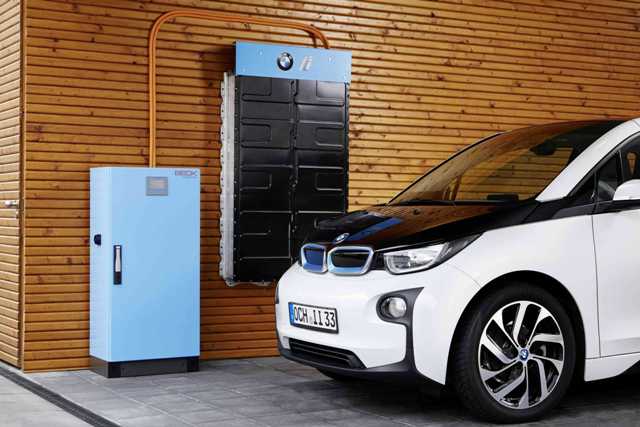
BMW introduces home energy storage unit using spent batteries from all-electric i3
by Cleantech Canada Staff

German car company becomes latest automaker to repurpose its battery technology, will roll into energy industry with new second-life battery

The energy storage unit will give used batteries from BMW’s all-electric i3 a second life as a stationary off-peak storage and backup power system. PHOTO: BMW
MONTREAL—You can add BMW Group to the growing number of automakers looking to drain more life out of their battery technology.
BMW i, the hybrid and electric vehicle wing of the German automaker, has introduced a new energy storage unit that uses spent batteries from its i3 electric hatchback to provide homes with off-peak energy or backup power.
“Coupled with the home charging and solar energy programs, the system enables BMW drivers to embrace holistic sustainability beyond e-mobility” Rob Healey, manager of EV Infrastructure for BMW North America, said.
Introducing the unit at the Electric Vehicle Symposium & Exhibition this week in Montreal, BMW said it will incorporate repurposed batteries from the 22 kilowatt/hour or 33 kWh models of the i3. Though the second-life batteries will have deteriorated through years of use on the road, the company said the unit will generally be able to power a household for up to 24 hours; household energy use in the U.S. ranges between 15 kWh and 30 kWh, according to the automaker.
Joining Nissan and Mercedes, which are both launching forays into the home battery market to compete with Tesla’s Powerwall, BMW said its unit can run on both new and second-life batteries. Touting the sustainability benefits of using of a spent auto battery, BMW said the system ensures batteries are used efficiently at all stages of life. Though Nissan’s recently-introduced xStorage device also uses repurposed batteries as well, Tesla’s Powerwall runs on a newly-manufactured power pack.
Working with BECK Automation, BMW said the unit will be optimized to operate as efficiently as possible, using an automated system to track real-time energy readings and make the necessary corrections. Similar to Tesla’s Powerwall, the wall-mounted unit is designed for basements or garages. Though the automaker said the new battery is market-ready, it has not yet released pricing details.
As BMW charges into the energy storage market, Tesla has begun shipping its Powerwall worldwide. Earlier this month, Toronto-area power provider, Veridian Connections, became the first Canadian utility to install Tesla’s energy storage unit, unveiling two Powerwalls at it’s Ajax, Ont. headquarters.